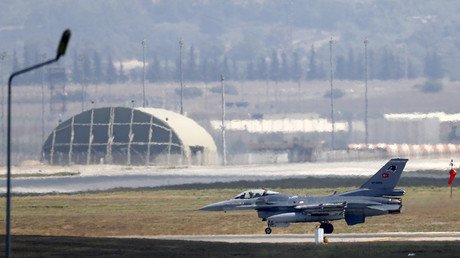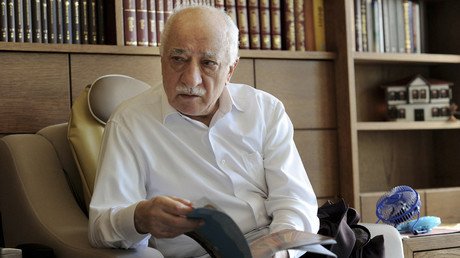Rift over US-based alleged coup leader, ‘muted’ response threaten to sour NATO-Turkey relations
Washington has dismissed claims of US complicity in the Turkish coup attempt as “utterly false and harmful” after Ankara declared any state standing by US-based cleric Gulen an enemy, further straining relations between the West and the key NATO ally.
Allegations of American involvement in the attempted military takeover in Turkey are groundless and have put a strain on relations between the two countries, US State Secretary John Kerry said while speaking to his Turkish counterpart, Mevlut Cavosoglu.
“[Kerry] made clear that the United States would be willing to provide assistance to Turkish authorities conducting this investigation, but that public insinuations or claims about any role by the United States in the failed coup attempt are utterly false and harmful to our bilateral relations,” State Department spokesman John Kirby said on Saturday.
“The US is not going to extradite this guy and I think he probably didn’t have much role in the coup,” defense analyst Ivan Eland told RT, commenting on Turkish President Recep Tayyip Erdogan’s Saturday appeal to his US counterpart, Barack Obama, to hand over Gulen.
“Turkey is probably doing this for propaganda purposes, so they don’t really believe it, they’re just accusing everybody they can accuse,” Eland added.
The cleric has been living in self-imposed exile in Pennsylvania since 1999 and strongly denies any involvement in the coup.
READ MORE:Turkish soldiers thought coup was military ‘exercise’
“Dear President Obama, I told you this before, either arrest Fethullah Gulen or return him to Turkey, you did not listen. I call on you again after there was a coup attempt. Extradite this man in Pennsylvania to Turkey,” Erdogan said addressing a rally of his supporters in Istanbul on Saturday, while stressing that the two countries’ strategic relationship and partnership dictate that the US comply with the request.
However, US officials have already indicated that they will consider extradition only if Turkey can produce compelling evidence that Gulen played a role in the events.
Apart from the controversy over the cleric casting a shadow on US-Turkish relations, the broader implications of political turmoil in Turkey could put the country’s strategic role as a major ally in the US-led NATO block under question, Eland argues.
“NATO counts on Turkey as being an island of stability in that area but, of course, Turkey has been anything but recently with ISIS attacks, Kurdish rebellion, inflamed by Erdogan himself and, of course, you have all these refugees flowing in their tooth,” he pointed out.
The US has long considered Turkey a major ally in the region, and its Incirlik air base in the southeast part of the country is essential to US-led NATO missions in Syria and Iraq. The site also houses US nuclear tactical weapons. However, on Saturday, the site was sealed off by local military authorities and access was denied to all US personnel. Power at the facility was also reportedly cut off.
The Turks were also dissatisfied with their NATO allies’ seemingly muted response to the coup attempt. Despite a number of statements issued by Western leaders supporting the “democratically elected government,” ethnic Turkish protesters in Washington demanded a stronger and clearer show of support for Erdogan. Notably, NATO’s chief put out a Twitter statement calling for “calm and restraint & full respect for Turkey’s democratic institutions and its constitution.”
While NATO-Turkish relations have already become uneasy due to Ankara’s policies, Erdogan’s recent behavior may give the military alliance reason to review them altogether, Eland said.
READ MORE: Will Erdogan survive Turkey's time of troubles?
“They have been able to deal with Erdogan in the past, but he is a bit erratic and he has also been cracking down on opposition,” he stressed, adding that Turkey is “very unstable and it is so largely because of Erdogan’s own policies.”
The crackdown on Kurds that have been fighting Islamic State (IS, ISIS/ISIL) in Syria and Iraq with US support, don't make Erdogan a very useful partner in the fight against terror in Washington’s eyes, Eland said.
READ MORE: Coup prevented, organizers arrested, situation under control – Turkish officials
“I don’t think he is a very good ally, because he is more concerned about the Turks than ISIS, the other Kurds, the YPG, the Syrian Kurds. He was bombing them and they are the biggest US ally in fighting ISIS.”
The mere fact that a military coup could have been attempted in one of the alliance’s member countries is already a huge “embarrassment,” he added.
“This is very embarrassing to NATO, because it views itself as the alliance of democracies, and so when you have a coup attempt in one of the democracies, this is very embarrassing to the alliance,” Eland said, pointing out that Erdogan’s rule “has been becoming more authoritarian anyway.”
“This problem, that we can have an autocracy in NATO, is an embarrassing one for the alliance,” Eland added.













